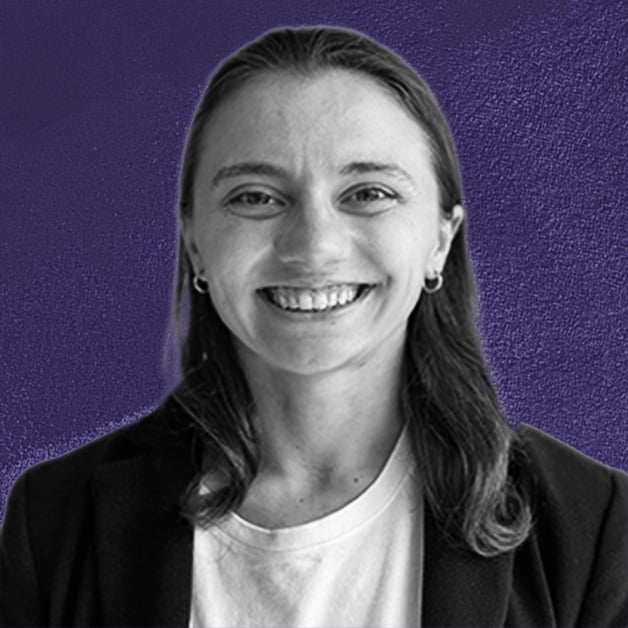
Carolyn Rivkees
Data analytics is an essential tool for businesses looking to thrive in today's data-driven landscape. It can empower organizations to make smarter decisions, optimize processes, understand customers better, and gain a competitive advantage in a rapidly evolving environment.
Successful data analysts also need to be strong communicators, a skill emphasized in the Kogod MS in Analytics program. Professor Virtu, an American University alumna of the math and computer science program, knows this firsthand. As she approached her own undergraduate graduation, she caught wind of the master's program and decided it was right for her.
Virtu first became interested in data science when she studied computational science in undergrad. She liked that the field played to her technical strengths in statistics and programming, while also maintaining creative freedom through problem-solving and storytelling.
In the program, professors teach students math theory and hard technical skills while also translating them into a business setting. “Professors really bridged the gap between theory and practice. We learned how complex theories could apply in actual jobs, especially ones that weren’t just research-based,” said Virtu.
Professor Virtu emphasized that communications were a key focus of the MS in Analytics program. Every time students had to write a brief, Virtu said she was challenged to cut it down by half. Students were encouraged to think about how their C-suite audiences and other high-level stakeholders would receive the information, and she and others learned how to succinctly articulate key points.
After graduation, Professor Virtu’s career led her to work with a lot of pre-IPO tech companies, including a few software-as-a-service startups. Because the companies were in such early stages, she wore many hats—from doing a bit of marketing to a bit of sales. But most of all, she focused on data and applied her high-level analytical skills to solve organizational challenges and make effective business decisions.
Since Virtu spent the majority of her data science career working for SaaS companies, the most common business questions would reveal insights into their financial levers. She was often tasked to use data to find ways to reduce customer churn, increase customer lifetime value, fine-tune market segmentation, and optimize lead funnels. Additionally, she has been asked to develop fraud detection models and recommendation systems.
“I would create databases, analyze the data, then produce operational plans like how we could get companies to increase their revenues by X percent or Y millions of dollars. Then, we could execute those plans,” Professor Virtu said.
Her analytics work taught her to approach data analytics with persistence and curiosity.
So many analyses will never actually be implemented or actualized. The process is extremely cyclical; it requires so much hypothesis testing and trial and error for just one set of questions."

Angela Virtu
Professor of Information Technology and Analytics
"Oftentimes, you need to go back and look at an entirely different variable or different metric to try and find your answer. A project with a defined end goal is extremely satisfying, but you don’t see that all the time in practice," Professor Virtu explained.
Professor Virtu learned firsthand that communicating complicated concepts in a clear, relevant, and relatable manner can better drive data-driven initiatives and facilitate meaningful collaboration. Beyond just seeking answers to tough business questions, Virtu enjoyed helping other people understand complex concepts—which required figuring out how to explain technical ideas in layman's terms.
“I found myself breaking down complex concepts frequently in the business world,” she explained. “If data scientists try to use technical terms with our stakeholders, they're not going to understand exact terminology or why we're using certain processes. Oftentimes, I found myself educating external parties to reach a shared understanding.”
Virtu felt a lot of parallels between her role as a kind of interpreter at work and the process of teaching. Her interest in helping others understand complex technical concepts led her back to Kogod.
While working at her corporate jobs, Professor Virtu was also a TA for Professor Espinosa’s ITEC-621 class, Predictive Analytics. She would return to campus to talk a lot about her time in the workplace and how she used predictive analytics in the real world. During COVID, she transitioned to an adjunct position for some of the analytics online courses, including ITEC-300 and Programming Tools for Analytics: R.
When I had the opportunity to come to Kogod full-time, I couldn’t say no."

Angela Virtu
Professor of Information Technology and Analytics
Now Professor Virtu will teach ITEC-621, Predictive Analytics, which students take in their MS in Analytics program. The course explores all kinds of math theories, algorithms, and modeling techniques. Professor Virtu finds that bringing an experiential approach to her classes is incredibly fulfilling, allowing students to make rewarding, real-world connections.
Through her teaching, students will build the necessary skills to critically think through a data-centric lens. To do this, Virtu brings in real-world applications blended with her personal experiences.
“I think being able to relate exactly what we’re learning in class with what I've done in my past career has been super helpful for students to not only understand what we're doing but also why we're doing it and how it connects to their future jobs,” Professor Virtu explained.
When students make business recommendations, she challenges them to get past the “what”. She believes recommendations become meaningless if students can’t effectively communicate both “why” a finding is important and the overall impact the implementation of their recommendation will have on the business unit.
“Ultimately, my goal is to prepare students to be responsible, thoughtful, and impactful leaders in the broader society,” she said.
Virtu is especially excited about where the future of predictive analytics is headed, and how she and her students can work to make analytics more accessible to a wider populace. Models like Chat GPT, built on open AI, have brought analytics and machine learning to a very accessible and public forum.
“Until recently, you had large language models that were inaccessible; they were behind APIs, or you had to be in the market to really be able to use them and access them and build upon them,” Virtu explained. “Now, you can simply go to a website and plug and play. I think the speed and the accessibility of these open models have forced some upper-level stakeholders to start acknowledging the importance of analytics and start looking to see where else data analytics could make an impact.”
Professor Virtu does note that these platforms still present concerns over privacy and misinformation. “I think we’re going to have to become really good critical thinkers and get better at identifying if something is real or not,” she said. “And a whole framework will have to be built around data privacy protocols around best use and ethics. I think that’s all to come. But this is just the start of the conversation! It’s all exciting.”
